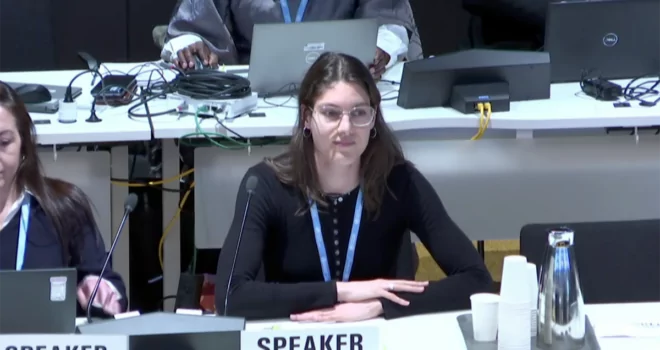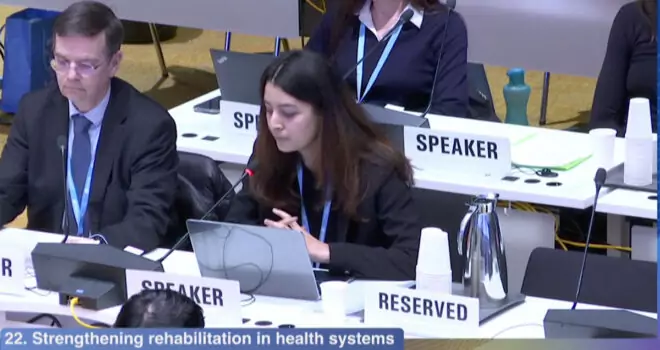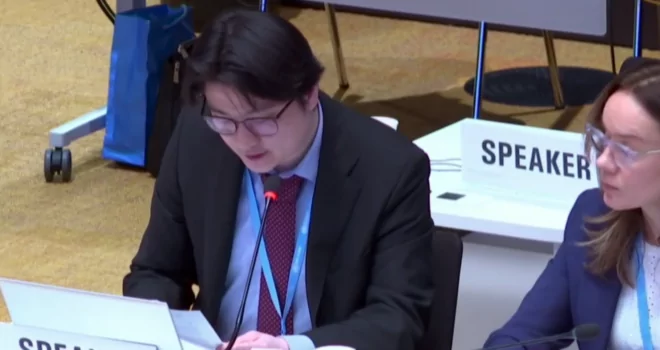The World Heart Federation (WHF) proudly represented the global cardiovascular community at the Seventy-Eighth World Health Assembly (WHA78), which concluded on 27 May 2025 in Geneva, Switzerland.
Throughout the Health Assembly, WHF delivered a series of high-impact statements across a range of agenda items to ensure that cardiovascular health remains central to global health priorities, debates, and decisions. In particular, WHF led a constituency statement on climate change and health and delivered individual statements on noncommunicable diseases, substandard and falsified medical products, maternal health and rheumatic heart disease, health emergencies, and pollution. WHF also co-led a constituency statement with NCD Alliance on universal health coverage, highlighting a need for equitable access to essential health services for circulatory conditions, especially cardiovascular disease.
Key Advocacy Highlights
Agenda Item 13.1 – Noncommunicable Diseases
WHF urged Member States to adopt bold global targets, building on its key messages from the UN Multistakeholder Hearing on NCDs:
- Treat 500 million more people with hypertension by 2030
- Aim for 50% global hypertension control by 2030
- Implement fiscal policies with at least 50% excise tax on tobacco, alcohol, and sugar-sweetened beverages
- Adopt the WHO Air Quality Guidelines (2021)
- Reduce premature NCD-related deaths and disabilities by 50% globally by 2050
Agenda Item 13.1 – Universal Health Coverage
WHF and NCD Alliance highlighted the urgent need to integrate NCDs, especially circulatory health services, into Universal Health Coverage benefit packages. We called on Member States to invest in comprehensive essential services – from prevention and screening to treatment and long-term care – and to scale up implementation of evidence-based, cost-effective, interventions, such as the WHO NCD Best Buys and HEARTS technical package.
Agenda Item 13.5 – Substandard and Falsified Medical Products
WHF echoed growing concern over substandard and falsified medical products, as a global threat to health, especially in low- and middle-income countries. We supported stronger engagement with non-State actors to effectively address the challenge.
Agenda Item 13.9 – Global Strategy for Women’s, Children’s, and Adolescents’ Health
WHF welcomed the new WHO Guidelines on Rheumatic Fever and Rheumatic Heart Disease and stressed a need for RF & RHD integration into primary health care, universal health coverage, and maternal health strategies to reduce cardiovascular-related maternal mortality, especially in low-resource settings.
Agenda Item 17.1 – WHO’s Work in Health Emergencies
WHF highlighted an urgent need to prioritize the needs of people living with noncommunicable diseases, especially cardiovascular disease, in health emergencies and to elevate NCDs within the global health security agenda. We advocated for stronger, more resilient, health systems to ensure continuous and equitable NCD care as well as for the integration of NCD services into preparedness, response, and recovery plans.
WHF also supported the adoption of a resolution on Strengthening the Evidence-Base for Public Health and Social Measure. Notably, WHF led an informal WHO session on PHSM research in April.
Agenda Item 18.1 – The Impact of Chemicals, Waste, and Pollution on Human Health
WHF highlighted the impact of air and lead pollution on cardiovascular health and supported policies to strengthen monitoring, regulatory enforcement, and public awareness.
Agenda Item 18.3 – Climate Change and Health
WHF urged Member States to recognize the disproportionate impact of air pollution and climate change on people living with NCDs, particularly cardiovascular disease. Key recommendations included phasing down fossil fuels, prioritizing vulnerable populations, and safeguarding public health policy from commercial determinants of health, especially industry interference.
WHA Resolutions
WHF also expressed strong support for a series of WHA78-adopted resolutions on Strengthening National Capacities, Rare Diseases, Medical imaging, and Strengthening the Evidence-Base for Public Health and Social Measures – which will shape the future of global health.
Pandemic Agreement
The Seventy-Eighth World Health Assembly formally adopted a historic WHO Pandemic Agreement, laying the foundation for a stronger and more equitable global approach to pandemic prevention, preparedness, and response. Key features of the Agreement include commitments to equity and solidarity, a One Health approach – integrating human, animal, and environmental health – and the establishment of a Pathogen Access and Benefit-Sharing (PABS) system. Once the PABS annex – currently under negotiation – is finalized and adopted at the Seventy-Ninth World Health Assembly, the Agreement will open for signature and subsequently enter into force upon ratification by at least 60 Member States.
WHF welcomes the important milestone and will continue to advocate for the integration of cardiovascular care and other essential NCD services into health emergency frameworks.
WHF Side Events
In parallel to formal proceedings, WHF hosted four high-level side events, convening Ministries of Health representatives, global experts, policymakers, and partners to explore concrete solution to the global cardiovascular disease burden:
- Advancing Cardiovascular Health for All through National Action Plans, which highlighted country-led strategies to address heart disease through comprehensive national plans.
- Protecting One Billion Hearts: Partnering to Accelerate Access to Heart-Saving Medicines, which focused on improving equitable access to essential cardiovascular medicines.
- Better Adherence, Better Control, Better Health, which highlighted the importance of supporting people living with cardiovascular disease to improve adherence and health outcomes.
- Healthy Hearts for Healthy Aging: Approaches to Cardiovascular Disease Prevention Across the Life Course, which explored opportunities for cardiovascular prevention and management at every stage of life.
Looking Ahead
As the Fourth UN High-Level Meeting on NCDs approaches, WHF remains committed to ensuring that cardiovascular health is prioritized across all dimensions of health and sustainable development. We will continue to engage with WHO, Member States, and our membership to advance progress towards ambitious targets and policy framework that place heart health at the core of resilient and equitable health systems.


